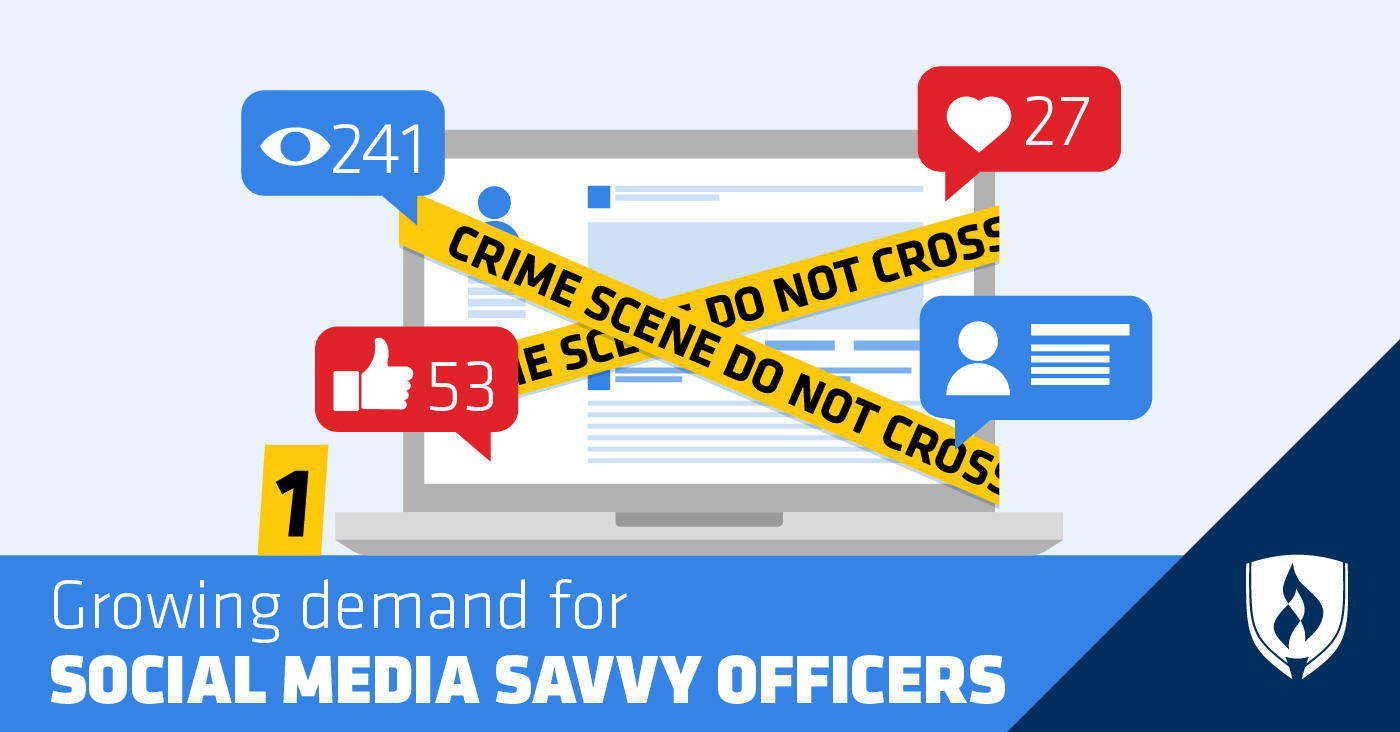
If your friends and family keep nagging you to get off of Facebook and start pursuing your dream career in law enforcement, just tell them you’re honing an in-demand skill.
Social media is sometimes written off as a frivolous time-waster. However, many in law enforcement now consider it an invaluable tool for their work.
Because law enforcement must always evolve to keep up with the world it protects, many officers and investigators have found success by leveraging social media in their quest for justice. 67 percent of law enforcement professionals surveyed believe social media helps solve crimes more quickly, according to Lexis Nexis.
Keep reading to learn about the new ways in which social media and law enforcement go hand-in-hand in crime-solving and investigating.
Growing demand for social media savvy officers
With the explosion of social media over the past decade, communication has become increasingly digitalized and less private. This has resulted in many law enforcement agencies viewing social media sites such as Facebook, Pinterest and YouTube as crime-solving tools. With the sheer prevalence of social media users and the vast amount of personal info they disclose online, individuals are aiding police by volunteering information about themselves.
Social media savvy officers are becoming an asset to police departments all over the country. In fact, about 86 percent of law enforcement departments report utilizing social media in criminal investigations, according to the International Association of Chiefs of Police (IACP).
While some officers bring working knowledge of social media through their own personal use, others are undergoing training to get the most out of social media platforms.
Whatever your background, the future of social media investigations looks bright. Of the 14 percent of departments that don’t currently use social media, 57 percent intend to do so in the near future.
How does law enforcement use social media?
Social networks have been helpful in several ways. Every so often a citizen will see something illegal or suspicious posted online and report it to authorities. But most in law enforcement take social media into their own hands. Uses include locating missing persons, identifying persons of interest, soliciting tips on crimes and tracking criminal networks. Police also use the platforms for corroborating evidence, which holds up in court nearly 90 percent of the time.
There is no special treatment for members of law enforcement when it comes to investigating on social media. Each website has its own privacy and legal rights established. Most websites require a subpoena or warrant before they turn over private information to authorities, reports CNN.
Some criminals think covering their tracks is as simple as erasing their social media activity. But social media sites can, in fact, recover deleted posts or deactivated accounts to archive incriminating evidence, according to USA Today.
Social media saves the day
Ohio police put their social media prowess to the test in their quest for justice for the high-profile Steubenville rape case in 2013. Thanks to a trail of incriminating posts on social media sites like YouTube, Instagram and Twitter, two high school football players were convicted and found delinquent in juvenile court, as reported by ABC News. Without the mountain of evidence—consisting of tweets, YouTube videos and Instagram photos—left online, prosecutors may not have won the case.
FACT: 86 % of law enforcement departments use social media in criminal investigations.
This year police in California used Pinterest to reunite a long-lost family heirloom with its rightful owners. After discovering bags of stolen jewelry during a routine traffic stop, police “pinned” photos of the stolen loot on the popular image sharing site. Eight hours later, the owner of a charm bracelet was identified through multiple sources. The bracelet was an engraved family keepsake stolen 30 years prior in a home burglary.
Police departments also use Pinterest to help locate criminals. They create Pinterest boards to spotlight images of individuals with a warrant out for their arrest, people of interest in homicides and robberies and wanted perpetrators. Some even include snapshots from surveillance videos. By spreading images across the popular website, police departments gain more exposure and better results.
Now you know ...
Gone are the ancient ways of the sleuthing Nancy Drew and Sherlock Holmes. Much of today’s investigations take advantage of new technology and are aided by voluntary information shared online. With social media so ingrained into the fabric of modern society, it’s no wonder law enforcement and social media have become such a dynamic duo.
If you’re interested in a career in law enforcement, continue to cultivate your experience with various social media sites. All that time spent online may just help you break a case someday!
Don’t forget to follow the Rasmussen College School of Justice Studies on Facebook and Twitter to learn more about trends in law enforcement.
Related Articles:




